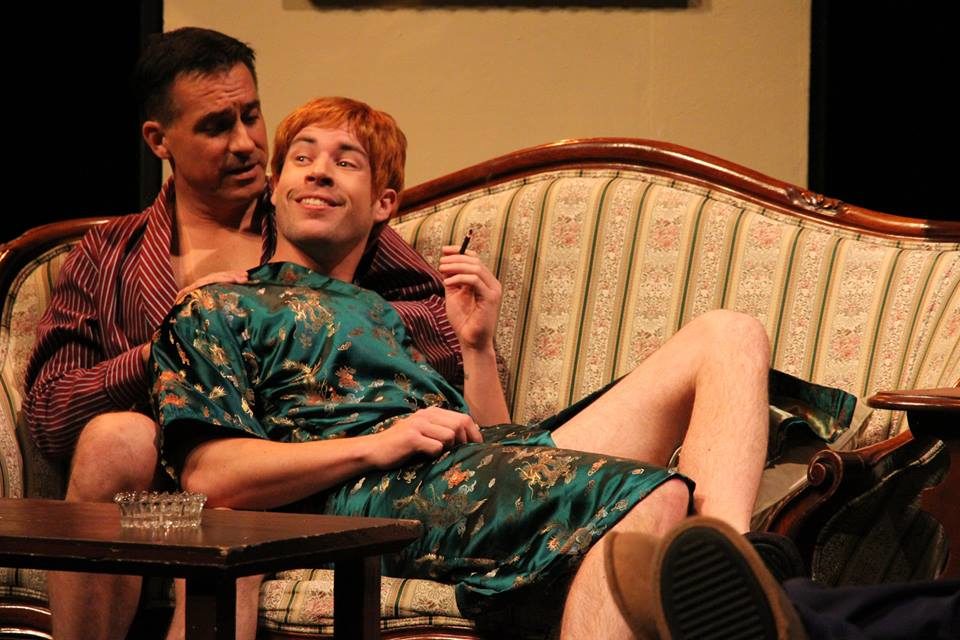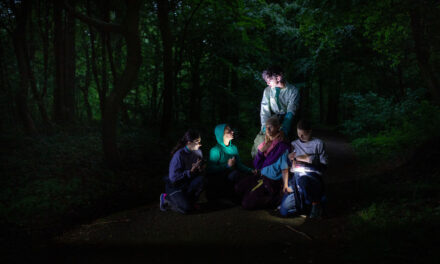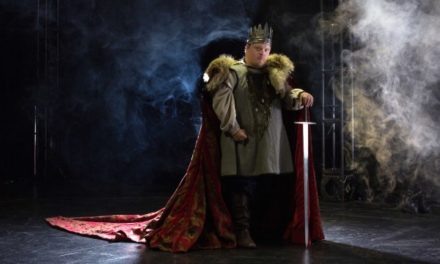There are moments in TotoToo’s production of Bent that are as good as anything that this enterprising company has ever done.
Indeed, the excellent performances of Phillip Merriman and Mike Rogoff as two doomed young lovers provide a compelling reason for theatergoers to seek out this sometimes problematic revival of Martin Sherman’s 1979 play about Nazi persecution of homosexuals.
“Queers aren’t meant to love,” declares Max, the promiscuous young gay portrayed by Merriman. It suggests the shallow credo of a shallow human being — which hedonistic Max undoubtedly is until the Nazis thunder into his life in 1934 and gradually force him into full acceptance of his own nature.
This is the year of the infamous “Night of the Long Knives” that sees a paranoid Adolf Hitler exterminate suspected adversaries — with one major target the homosexual Ernst Rohm who was once a trusted friend and colleague. This triggers a country-wide offensive against homosexuals — a little-remembered aspect of the Nazi horror until Martin Sherman, who is both gay and Jewish, wrote Bent.
But the play begins on a note of caustic humor as we encounter Max — glum and hungover in his flamboyant bathrobe — quizzing his anxious lover Rudy about how badly he misbehaved the night before. The answer soon materializes with the swaggering appearance in boxer shorts of his one-night stand — Wolf by name. The general levity of the talk suggests that we might be in for a gay take on a classic morning-after-the-night-before situation. But then comes the banging on the door and the arrival of the Nazi SS. Seemingly within seconds, Wolf is dead at their hands, with Max and Rudy fleeing for their lives.
At this point, the production demands much forbearance from the audience. The Nazi villains emerge as ludicrous comic-book caricatures to the point of being embarrassing. And this extends to their uniforms, evidence of a production that has failed to do its homework when it comes to authenticity of costuming. As for the murder of Wolf, which should deliver the play’s first shocking moment, it is so clumsily staged that it is almost laughable. Max and his lover may have managed to get away for the time being at least, desperately seeking safety, but how convinced are we really of their plight?
This is not the first production of Bent to encounter difficulty when it comes to giving the Nazi characters plausibility, and this may well indicate deficiencies in the script itself. Certainly, in this production at the Gladstone, they defeat director Josh Kemp — until the moment when John Collins arrives on stage. By this time, Collins has already impressed with his cameo appearance as Max’s pragmatic uncle laying down the unpalatable options facing his feckless nephew — and this beautifully-staged scene, an eerie encounter on a park bench in the dusk, has the intensity and immediacy the play demands. But then comes Collins’s reappearance, this time exuding icy menace as a black-clad Nazi officer — and here we can fully accept the reality of the Nazi horror. We can also appreciate how well an accomplished actor like Collins can employ mere silence as a dramatic weapon.
The play itself has sparked controversy. A 2006 London revival saw playwright Sherman and Daily Telegraph critic Charles Spencer almost come to blows following the publication of the latter’s review. Both Sherman and actor Stephen Callow accused Spencer of being homophobic for suggesting that Bent is an exploitive play in which “the dramatist bums a lucrative lift on the Holocaust” in the service of “manipulative entertainment and gay propagandizing.”
Such an indictment seems unfair to Martin Sherman, a Jewish playwright. At its best, Bent is a fiercely effective theatrical work, driven by a moral fury that is unassailable. But Sherman must have known at the time that he was taking a big risk in presenting us with a Max who, as a protective measure against full Nazi retaliation, initially claims to be Jewish. Following capture, he wears the yellow star rather than the pink triangle assigned homosexuals and argues that it’s safer to be Jewish than queer. This is incendiary stuff.
Which brings us to perhaps the most disturbing moment in the dramatic arc that Phillip Merriman travels in his portrayal of Max. The poignant victim here is Rudy, his caring lover, portrayed with anguished vulnerability by Aaron Mellway. This is the sort of homosexual innocent whose very mannerisms make him a target, and he will pay the price — a price rendered even more terrible by Max’s denial of him during a confrontation with a Nazi officer. It’s a moment of almost biblical horror, and Merriman’s Max can’t conceal his revulsion and self-loathing as he betrays his terrified young lover in order to ensure a further lease on his own survival.
Nevertheless, productions must try to ensure Bent a wider canvas, one in which the reality of the Holocaust is acknowledged and affirmed. Perhaps Martin Sherman is taking our prior knowledge of the Final Solution too much for granted, but its shadow should still hover more strongly over the evening than it does. Context does matter.
The main strength of Josh Kemp’s production stems from its emotional intimacy. The play is certainly about fortitude in the face of unspeakable evil, but ultimately it’s about love, identity, and commitment. It’s also about the need to accept yourself for who you are — a theme also pursued under different circumstances in Michel Tremblay’s Hosannah. There are lessons here that must be learned by Max as he finds himself, still wearing that yellow star, in the Dachau concentration camp, and it is a gay inmate named Horst who opens the door to Max’s self-acceptance and redemption.
The two are assigned the soul-shriveling daily duty of endlessly shifting a pile of the rocks from one section of the stage to the other. They aren’t supposed to communicate with each other but they do.
Gradually a bond, initially one based on sexual desire but later one sustained by deeper emotions, develops between them. And meanwhile, in this extended sequence, we are conscious of their growing exhaustion — such is the naturalistic power of these moments that those rocks do seem to be getting heavier and heavier.
Then comes that now-famous sequence in which the mere power of erotic language leads both of them to achieve sexual release without even touching each other. We’re also becoming conscious of the emergence of a more caring and vulnerable Max — and Merriman has some of his finest moments with his halting surrender to emotions he has long suppressed. But we’re also witnessing simple goodness and honesty in the beauty of Mike Rogoff’s understated performance as Horst. It’s rare for resilience to be communicated with such quiet eloquence. The play’s ending is inevitable, but what lingers most in our mind? The act of reckless heroism which brings down the curtain or a poignant sense of loss?
The play’s emotional currents are in safe hands here. Josh Kemp is a discreet but thoughtful director. He does away with the moments of full nudity which usually crop up in the first act, and with no appreciable damage. It’s the changing, sometimes painful chemistry of human relationships that fascinate him. The sensibility is gay, but there’s an underlying universality to what happens in the lives of Max, Horst, and Rudy. The production doesn’t always reach the play’s beating heart, but the performances that matter most still bring substance to the evening.
The TotoToo Theatre production of Bent continues at the Gladstone to October 21.
Director: Josh Kemp
Set: David Magladry
Lighting: Frank Donato
Sound: Bob Krukowski
Costumes: Dael Foster
This post originally appeared on Capital Critics’ Circle on October 17, 2017, and has been reposted with permission.
This post was written by the author in their personal capacity.The opinions expressed in this article are the author’s own and do not reflect the view of The Theatre Times, their staff or collaborators.
This post was written by Jamie Portman.
The views expressed here belong to the author and do not necessarily reflect our views and opinions.


















